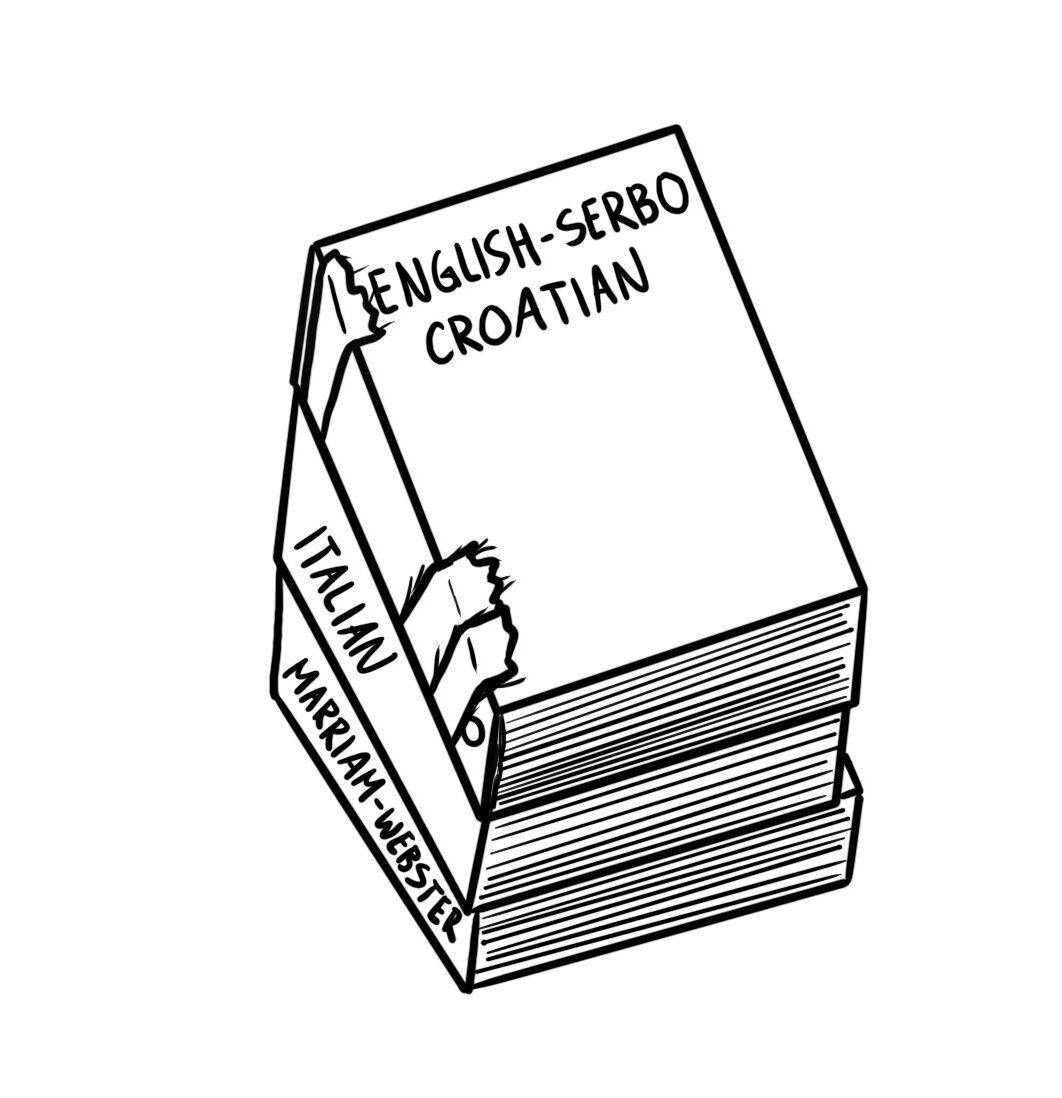A polyglot loophole found in the Balkans?
September 12, 2025
 Mia Lasic-Ellis
Mia Lasic-EllisWhile Serbs nowadays throw up a holy trinity salute to express their national pride and religion—like Albanians who sign an eagle across their chests with both hands—when I occasionally throw up my thumb, index and middle fingers in a photo, I’m not just celebrating my heritage.
I’m also counting the number of additional languages I managed to fool college admissions officers into thinking I spoke—Bosnian, Croatian and Serbian—when in reality, I only consider myself fluent in several dialects equating to one mutually intelligible south Slavic language. Ethnic tension permeates the alphabetical gaps between the languages listed on the Common Application like the present borders between the Yugoslav constituencies my parents grew up in before war tore the region apart in the 1990s.
Two years later, I moved into a college dorm for the second time since enrolling at Bowdoin.
Part of living in Coles Tower entails a beautiful view and quick access to a hot meal at Thorne, but I’m wise enough to know that truly feeling at home requires deliberate adjustment. While the stucco in our apartment does bear some resemblance to the plaster walls of my childhood home, settling in always involves leaving a trail of my various tchotchkes, but moreover, anchoring a more significant keystone of Isailović family interior design: stacked reference sources.
Having a parent in academia, the floor tiles in my childhood home were accented with textbooks of the natural sciences, so I decided to carry on the tradition of blessing my roommates with my current fixations through a dense stack of five dictionaries on top of my desk, situated by the entrance of our suite.
I wouldn’t consider the change in elevation from the ground to a counter to be much of an upgrade, but since linguistics is a subject I’m more interested in than chemistry, I guess we ought to raise the roof in the name of more convenient organization and discovering our passions.
Besides the Merriam-Webster and Barron’s logos indicating the copies used to translate between English and the various Romance languages, my most prized dictionary has no discernible design on its spine, but rather, decaying strips of duct tape binding a bundle of 800-some yellow pages for a bargain price of 190 dinars. Inside the back cover, consistent with centuries of European book culture’s hydrodipped and illuminated designs, the faded ink pressed into the cardboard from a Hello Kitty stamp abused by the force of my toddler hand immortalizes the Y2K era. Similarly, the bold text on the cover mourns the love affair between today’s language of technology and one seemingly left in the 20th century: “ENGLISH – SERBO-CROATIAN.”
Sometimes I can’t help but wonder what the future of the English language would have been if after the Revolutionary War, Patriots had begun calling the dialect of English they spoke “American” out of spite for England and tried to pass it off as a completely different language. Of course, people here certainly do speak and write words differently from people in Great Britain, but our dialect is still mutually intelligible and has identical grammar rules and similar vocabulary to British English.
A similar scenario seems to define my experience of having parents from both Serbia and Bosnia and Herzegovina. Even though my mother and father are Serbs, I grew up speaking two separate dialects that are today associated with distinct ethnoreligious groups of Muslims and Orthodox Christians.
Violence between Bosniaks, Serbs and Croats within the past century has cultivated a sense of bigotry targeting dialects, which are merely spoken by individuals as a matter of where they are situated rather than a deliberate choice. For example, even though Serbian and Croatian use differing Cyrillic and Latin alphabets to spell phonetically identical words, throughout history, restrictions on the use of both alphabets in each country have been used to prevent the free expression of ethnic minorities in their respective places of worship.
On a much less profound level, sometimes upon returning to Serbia, I get funny looks for using Croatian or Bosnian words that I grew up saying with my mother, a Sarajevo native, even though I’m also a Serb. These words are not associated with any type of religion or ideology alternate to Serbia or Orthodoxy, but rather describe entirely insignificant and common terms: mushroom, summer and bless you.
I’m not discounting how difficult it is for people who have been persecuted to establish trust with their former or current oppressors through a shared aspect of their identity, but labels associating language with separate ethnicity discount the intersectional relationship between nationality and ethnicity in the Balkans. It is naive to expect a term like Serbo-croatian or Yugoslavian to come into use again,considering the lack of religious freedom and a devastating civil war that destroyed the former nation, as well as the additional independence and recognition of Bosnia and Montenegro, whose inhabitants would demand equal representation in the name of the language. Luckily, some organizations have designated an acronym for the language combining the first letters of each language so that various ethnic groups are represented, which is what I prefer: BCMS.
Nevertheless, I suppose different individuals would call that collection of chunky and oversized books in my room folios or coffee table books instead of reference sources like I do, and who am I to deny the validity of their jargon? For now, I call my language Serbian since that’s the most self-explanatory response but also a description of the girl who speaks it.
Olga Isailović is a member of the Class of 2028.

Comments
Before submitting a comment, please review our comment policy. Some key points from the policy: